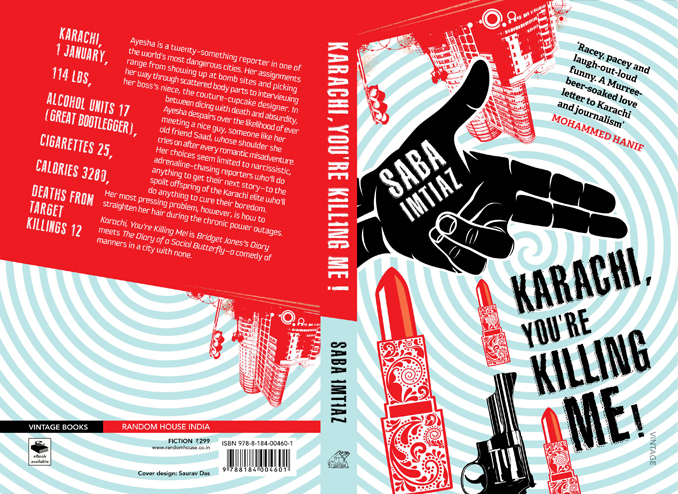Written by: Zahrah Mazhar - Posted on: February 12, 2014 |  Comments | 中国 (Chinese)
Comments | 中国 (Chinese)
Google Translation: اُردو | 中文
Saba Imtiaz’s tip #1 on surviving Karachi: Don’t be stupid
Saba Imtiaz is a twenty-something freelance journalist in one of the world’s most dangerous cities. Her assignments range from visiting the flood-affected areas of the country to interviewing the owner of the hottest new seafood joint in the city. And while this introduction may sound familiar to that of Ayesha Khan, the protagonist of Saba’s forthcoming novel Karachi You Are Killing Me! , she calls it a work of fiction.
“Of course there are similarities between me and the main character,” she laughingly tells me over coffee and a plate of sweet potato fries. “Some parts of the book are based on real events and I thought a fair bit of it would be me, but then characters start taking on a life of their own. I often found myself shocked at how Ayesha, a reporter working for a newspaper in Karachi, reacted to certain situations – in ways that I never could.”
While the title may suggest that the book is about Karachi, Saba clarifies that it is not representative of one city. “It speaks more of a certain age group, their lifestyle and the ridiculous things that make up their life which sound bizarre to others. It is based on the life of any single person in that age bracket, really.” She credits the idea of writing a book on the life of a young woman juggling work and personal life in Karachi to Faiza Sultan Khan, editor at Random House India. “She is the reason behind this book and I owe her for pushing me to do it.”
It took Saba less than a year to write her debut novel, during which she was also freelancing. And while Karachi, You’re Killing Me! hasn’t even hit the bookshelves, Saba is already on to her second book. “The working title for my second venture is No Team of Angels. It is a non-fiction book on the drivers of violence in the city. Right now I’m going over the manuscript.”
One can assume that Saba’s understanding of the key factors of violence in Karachi comes from her career as a full-time journalist – a field she envisioned herself actively pursuing from an early stage. “I always wanted to get into journalism, as cliché as it may sound. I always wanted to have a career in writing.”
 |
Saba’s first job as a journalist was at The News International after which she moved to The Express Tribune, where she started at the life and style pages, switched to national news and then, finally, to the Karachi pages. “For someone just starting in the field, working in The News was a great learning experience since it’s a very old newspaper. Tribune was obviously a very different experience – it had just been launched, and I found a completely new freedom in being the section head, being involved in the hiring process and other liberties which perhaps would have not been available to me at such an early stage at other newspapers.”
Within a year at Tribune, Saba had moved out from behind the scenes and was working in the field; and while being a female reporter in a city like Karachi might be daunting for some, she took it in a stride. “I never felt that being a female journalist was difficult. I feel the challenges for men and women in this profession are the same. In fact, a lot of things were easier for me because of my gender, such as getting access to stories and people that men couldn’t. It’s simple – if you look and act committed [to your job], then people will treat you the same way.”
This straightforward approach helped Saba in not being overwhelmed by the city that has become notorious for its rampant muggings, kidnappings and target killings. “I lived in the United Arab Emirates for the first ten years of my life, moved to Lahore for a year, and then shifted to Karachi in the mid-1990s which was possibly one of the worst times for the city. Over time, I developed a love-hate relationship with Karachi and it became my home.”
Even though she hates the word ‘resilience’ and “could ban the word if she could”, she believes that being resilient is a part of living in Karachi. “Violence is around you or happening to you and it’s not like anyone is used to it or accepts it, but you adjust your life around it.”
Having said that, Saba offers a simple, no-need-to-decipher survival tip to all Karachiwalas: don’t be stupid. “It’s the general rule for everything in life. Don’t walk around with too much cash or don’t go to neighbourhoods which are known to be unsafe after a certain time.” Other than that, she’s all for exploring the city and making it your home. “Don’t be stuck in a rut of 20 cafes – that’s what will make you hate your life. Go around the city and to its old neighbourhoods. Don’t stick to a clique and meet people, because you’ll never find as interesting a mix of people as you do in Karachi.”